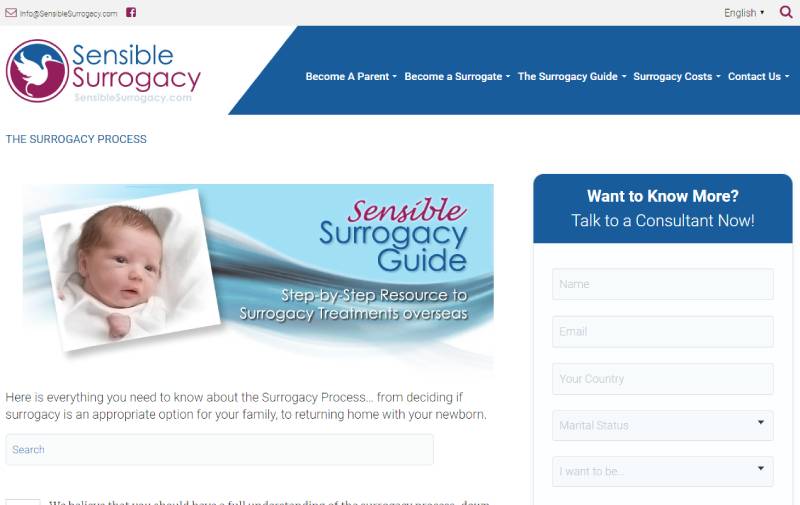11 Common Surrogacy Questions Answered By An Expert

Surrogacy is both a hot and a taboo topic, so we interviewed Bill Houghton, author of the Sensible Surrogacy Guide, who is an expert on the topic to provide you with useful answers.
Many people choose surrogacy as a way to get children for various reasons.
There are also many famous couples who got their children through surrogacy. We will list just a few of them like:
- Kanye West and Kim Kardashian
- Jimmy Fallon and Nancy Juvonen
- Matthew Broderick and Sarah Jessica Parker
- Zach Gilford and Kiele Sanchez
- Erik Asla and Tyra Banks
- Dwayne Wade and Gabrielle Union
- Fredrik Eklund and Derek Kaplan
- Shaun T and Scott Blokker
- Ricky Martin and Jwan Yosef
So here are the most frequent questions about surrogacy and the answers from the founder of Sensible Surrogacy.
Could you please tell us something more about Sensible Surrogacy? When did you start the company, why and what was your experience with surrogacy before starting the company?
I started sensible surrogacy in 2012 when my kids were born in India. At that time, surrogacy was not the media darling that it is today; it was very difficult to find information about the service. When I get home with my husband and our kids, I was inundated with questions about how surrogacy works; was it legal; is it safe; is it expensive. So instead of answering every question one at a time I decided to put up a website and list all of the most frequent questions that I had received. That website was SensibleSurrogacy.com, and it’s still the website that I use today for the Surrogacy Guide.
Of course today surrogacy and India is no longer possible, but over the years I’ve met agencies in different countries. I’ve worked with vendors in Thailand and Ukraine and Kenya and the United States and all over the world. And I have helped couples and almost every continent understand what’s possible.
And as I’ve worked with different agencies and different clinics, I’ve added to the initial list of frequent questions, and now there are hundreds of questions and posts in Sensible’s Surrogacy Guide. My goal has always been to make the Guide the most complete and reliable and objective source of information about surrogacy worldwide. I am a firm believer in and advocate for surrogacy when it’s done ethically. But I also have met a lot of less-reputable organizations and service providers. So I feel that I have an obligation and an opportunity to really help people find their best path forward. I can do something that’s important for families like mine — something that really makes a positive difference in their lives, and can do a lot of good for surrogate mothers around the world.
#1 Is surrogacy legal?
Yes, surrogacy is legal in many countries, mostly in Eastern Europe or North America. In each country the laws are different, and some have restrictions on who can perform surrogacy. But each allow surrogacy and have some legal framework that protects both intended parents and surrogate mothers.
There are also countries where surrogacy is prohibited by law and clearly those are the countries we would stay away from. There are also countries where there are no laws about surrogacy either for or against. Those are what we would call “unregulated surrogacy destinations”.
Unregulated surrogacy destinations would include places like Mexico or Kenya or Guatemala, where there are serious risks because there is no legal framework. So we advise couples to stay away from places like that.
In short, we always advise couples only to work in countries where there is a supportive legal framework. Fortunately, there are a number of very safe and secure countries that fit that definition.
#2 Are single men or same sex couples allowed to hire a surrogate?
There are several countries where single men are same-sex couples can pursue surrogacy legally. For example in the United States or in Canada surrogacy is legal for same-sex couples.
There are also those countries where surrogacy is legal but is strictly restricted only to heterosexual married couples, including Ukraine or Georgia. Sometimes we see in those countries illicit programs that carefully navigate the local laws to allow single men to pursue surrogacy. We also strongly discourage these types of programs because they have inherent risks, and the truth is that there is a fine legal line between a responsible and ethical surrogacy procedure and human trafficking.
#3 Is it possible to hire a surrogate from another country?
Some countries and some clinics offer what we would call “cross-border programs”. These are programs where the surrogate may be from one country but she is sent to a clinic in another country to become pregnant. The benefit is that clinical fees may be lower in the overseas country. But the pregnancy and delivery will take place in the country where the laws are more favorable and the baby can be born and return home more easily.
There are cross-border programs for example between the United States and Mexico, where Mexican surrogates with American visas may come to the USA to give birth. Another option may be for a US surrogate to travel to Mexico in order to receive an embryo transfer and become pregnant.
Cross-border programs often don’t make a lot of financial sense. If your surrogate is from the United States then the cost of the program is still going to be high because surrogates in the US make $50,000 or more at a minimum. So although you may save a little bit of money on your clinic fees, it probably is going to cost you the same amount in travel expenses for your surrogate to travel back-and-forth between the US and Mexico.

#4 How long does it usually take to find surrogate?
The time needed to find and clear a surrogate depends on the country where your journey is taking place. Canada for example can take from 6 to 18 months to find a qualified surrogate. In Ukraine, finding a surrogate is easier because there are professional recruiters and advertising that supports the search process. So in Ukraine a surrogate can be found in about four weeks. In the US it will take from 2 to 3 months to find a qualified surrogate.
#5 How much does a surrogate cost?
In the US, a surrogate’s total compensation package will be at least US$50,000. Overseas surrogates make about the same amount when adjusted for the cost of living. So for example in Ukraine your surrogate makes only about $15,000, but the cost-of-living is 1/3 of what it is in The United States. So in real terms your surrogate in Ukraine is making the same amount as your surrogate in St. Louis who makes $45,000. But if you are an American traveling to Kiev, you’re paying out of pocket just a fraction of what you would pay to a surrogate in your home country.
#6 What affects the price the most?
Surrogacy prices vary widely from country to country. And the two factors that most influence the total cost of surrogacy are going to be the cost of living and the cost of medical care.
If your surrogate lives in a country like Ukraine where cost-of-living is relatively low, then the surrogate’s compensation will be low. But if your surrogate lives in California where the cost of living is high, you can expect that she is going to be quite expensive. That will significantly add to the total cost of your surrogacy program. In general, your surrogate’s compensation is about 50% of the total cost of your surrogacy journey. So if you have to pay a lot for your surrogate, then you can expect the total cost of your journey to be quite high.
The second factor in the price of surrogacy is the cost of medical care and insurance in the country where the surrogate is going to live. We all know that the American medical system is the most expensive in the world, and that contributes to the very high cost of surrogacy in the United States. Meanwhile surrogacy in Ukraine is much more affordable in part because the country has a national medical care which covers all of the prenatal care during the pregnancy as well as the delivery and any complications for the baby or for the surrogate during the delivery.
Also the private American insurance market is extremely complicated and difficult to predict and budget for. As a result, couples should plan on spending thousands of dollars additional to cover insurance costs (assuming that insurance will be available, which is not always).
#7 What is the average surrogacy success rate?
If the egg donor and sperm donor are both healthy and the surrogate mother is fertile and has a history of successful pregnancies, then there is absolutely no reason why any surrogacy journey would not be ultimately successful.
The more pressing question will be how long it will take to have a successful delivery, and this will depend on how many attempts you need to become pregnant. An excellent clinic in the United States may require only one or two attempts to achieve a pregnancy, whereas a very good surrogacy clinic in Georgia may not achieve a successful pregnancy until four or more attempts. But in general, if all of the components are there and healthy, there is no reason why the US program or the Georgia program would be not ultimately be equally successful.
#8 Are there any religious or ethical issues when it comes to surrogacy?
Surrogacy is clearly a controversial issue and there are religious and social issues surrounding the practice. The most common ethical issue is the treatment of poor women who make up the bulk of surrogate mothers around the world. In some countries, surrogate mothers are among the poorest of the poor population. And as such they are easily exploited by disreputable agencies that make money by forcing them into surrogacy agreements which they may not fully understand. In some patriarchal countries, surrogate mothers are forced into service agreements by their husbands so that their husbands can benefit. These are all real ethical and moral concerns which need to be considered.
In the United States and other Western countries this is less of an ethical issue because women are more empowered financially. It’s more difficult to argue that women can be forced into surrogacy agreements for financial reasons. For example, in the United States, one of the primary qualifications to become a surrogate is that the woman must be financially independent. Agencies will not accept surrogate mothers who are receiving any financial assistance from the government. This is the US’s attempt to mitigate the risk of exploitation.

#9 Is it possible that a baby looks like the surrogate mother?
It’s important to note that surrogate mothers are not genetically related to the babies they carry. The egg and sperm that are used to create the embryos (that later become the fetus) are from the intended parents themselves. And so the baby will only look like the intended parents.
The surrogate mother will carry the baby during the pregnancy, which is certainly an important and critical role. But she has very little to the actual physical make-up of the baby. The surrogate provides a safe and nourishing environment in which the baby develops. To the extent that the baby is a product of that environment, then the baby certainly has the surrogate mother to thank for much of who he is. But the physical appearance and future characteristics of the baby are solely determined by the intended parents.
#10 What are the chances that the surrogate mother will get attached to the child?
All parents considering surrogacy are afraid, at one point or another, that the surrogate is going to become attached to their baby and refuse to give the baby over after the delivery. Ironically the surrogate’s main concern is always that the parents are going to lose interest in the baby and that she will somehow be stuck having to take custody and care for the baby herself.
The reality is that in a country where surrogacy is regulated and there is an established legal framework in place, the roles of the intended parents and the surrogate are both clear and enforced under the law. In these countries, there is no way that the surrogate could make a claim for parental rights, and there is no way that the parents could somehow decide to abandon the baby in the care of the surrogate.
However if you were to pursue surrogacy in a country where there is no regulation (what we call an “unregulated surrogacy destination”) then there is the opportunity for the surrogate to make a claim for parental rights. Under the laws of those countries the surrogate is considered the legal mother, and her name appears on the birth certificate. In these situations, the parents will have to complete an adoption process or some sort of parental transfer process to remove the surrogate’s name from the birth certificate and replace it with the name of the non-genetic parent, usually the mother. The process can sometimes take months or even years.

#11 Which books or guides would you recommend to people looking for surrogates?
There are several books about surrogacy that cover every aspect of the process. We recommend couples who are interested in starting their own journey– who want to know more about surrogacy, how it works and what are the costs and risks in different countries — we recommended they visit the Sensible Surrogacy Guide online at sensiblesurrogacy.com.






